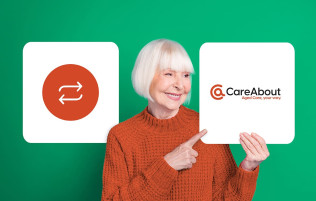Top tips on how to protect older Australians from scams

Scams can feel like they’re everywhere these days and can be particularly concerning for older Australians. Scammers are becoming more and more sophisticated. Whether they come via email, phone call, text message, or social media, it feels like we have to constantly be on high alert. However, with some caution and awareness you can feel better equipped to tell the difference between the real-deal and a scam.
Knowledge is power, isn’t it? To protect Australians over 65 from scams, it’s crucial to be educated about scam prevention. Whilst not exhaustive, in this article, we share our top 5 tips on how to best prevent older Australians from falling victim to scams.
While this article offers valuable insights to enhance awareness, it’s crucial to remember that it is only meant as a guide and should not be relied on alone to avoid scams.
What are the most common types of scams for over 65’s?
The most common types of scams are phishing emails, online purchase scams, health scams, tech support scams, and advance fee fraud scams targeted specifically to people in their older age who may be less familiar with technology. Learn more about each one below:
Phishing Emails
Beware of unsolicited emails that ask for personal or financial information. Always double-check the email address and never click on any links unless you’re certain of the sender’s identity.
Online purchase scams
Online purchase scams occur when individuals or fake websites offer products or services at attractive prices. After making a payment, you’ll receive subpar or counterfeit goods, or more likely, nothing at all. These scams often target online shoppers looking for deals or rare items.
Medicare or health scams
Never give out your Medicare number to anyone over the phone or via email unless you initiated the contact and are certain of the entity you are communicating with. When applying for government funded Aged Care support and funding, My Aged Care will ask for your Medicare card over the phone and this is entirely legitimate if you initiated the contact.
Tech support scams
In tech support scams, people pose as tech support representatives from well-known tech companies or antivirus software providers. They will claim that your computer has a virus or security issue and offer to fix it for a fee. They may ask for remote access to your computer or request payment for fake services.
Advance fee fraud
Advance fee fraud involves scammers promising a large sum of money in exchange for a small upfront fee. You’re asked to send money or provide your banking information in order to receive the money – which of course, you never will.
How do I recognise a scam?
Recognising a scam isn’t always easy but there are some common themes. Stay vigilant and be wary of any of the following:
1. It sounds too good to be true!
If it sounds too good to be true, it probably is. If someone is offering you a great deal, a high return on investment or sums of money, it’s most likely a scam.
2. Urgency and panic
Scammers try to instil fear and create a sense of pressure so that you act quickly and without thinking things through properly.
3. Asking for your personal information
As we mentioned above, any email, text or phone call that asks you to disclose personal information is likely to be a scam. Never give out any personal details without first verifying who you’re communicating with and what it’s for.
4. Spelling and grammar mistakes
Keep an eye out for misspelled words or awkwardly written sentences. Legitimate organisations are unlikely to have spelling mistakes or incorrectly-worded passages. Emails or websites that look unusual or unprofessional are also big red flags. If something doesn’t look or feel right, it probably isn’t! Trust your gut.
Using technology safely: seek advice from experts
So much of our lives are now surrounded by technology. Technology can make daily tasks, social interaction and healthcare so much easier but for those who have not grown up using it, it can be overwhelming.
With so many options as well as such a high risk of being hacked or scammed, many seniors shy away from using technology that can help them.
CareAbout reached out to the experts from Technology Connections to help prepare these Cybersafety tips:
Top 5 tips to help older Australians stay safe at home
1. Context is important
If you receive an email or text requesting something of you or offering you a deal that seems too good to be true, do not respond unless you know the person or can verify that the company is who they say they are.
2. Don’t click links from unverified senders
Only click links in emails if they are from a person or organisation that you know. As above, make sure the email address itself matches the person or organisation, not just the “From” name.
3. Use multifactor authentication for financial services
Financial services all offer (or enforce) multifactor authentication when logging in to your accounts, or to confirm the transfer of money. Multifactor authentication means that you’ll have to prove who you are in more than one way. For example, you will need to log into your account using your password, and then you will need to provide a code that is sent to your mobile phone.
4. Look for the padlock
‘Safe’ websites will have a little padlock icon in the address bar. Look for this symbol to feel confident that the site you’re visiting is a trustworthy one: ![]()
5. Never provide remote access to your computer or phone
A current favourite of scammers is to take over your computer, tablet or smartphone and access all of your information. However, this can only happen if you provide consent via an app or program such as TeamViewer.
CareAbout can help you navigate your Aged Care options
Most of us would agree that technology is a powerful tool to connect people of any age. Amongst other benefits, technology can promote social connection for older Australians. Being informed about how we use technology is key.
Other ways of assisting social wellbeing can be explored through government funded Home Care Packages. Social support can form part of the care older Australians can receive funding for. CareAbout’s Expert Care Advisers can assist to understand what is available. Simply give us a call today! Our guidance is free for you and your family and can save you hours of time researching options.








